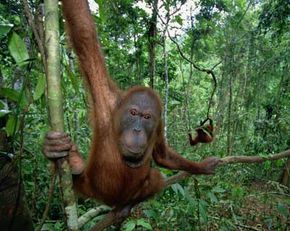In the world of great apes, you could call orangutans the outcasts. Of the four species of apes, orangutans are the only ones found in Asia-- gorillas, chimpanzees and bonobos all come from Africa. And unlike their mostly terrestrial relatives, orangutans spend almost their entire lives in trees. Their long, powerful arms, which can reach 6.6 feet (2 meters) in length, are perfect for swinging from branch to branch and their feet are more like hands in terms of dexterity and grasping strength [source: World Wildlife Fund].
These arboreal adaptations make orangutans about as awkward on the ground as they are graceful in the trees. For them, walking along the floor of the tropical and subtropical forests is a slow and cumbersome task. Since everything they need is available within the treetops, orangutans tend to stay aloft. They build sleeping nests from leaves and branches, and they dine on bark, leaves, flowers and more than 300 kinds of fruit collected by swinging from tree to tree [source: Orangutan Conservancy].
Advertisement
Aside from their physical and geographical differences, many orangutans are significantly less social than their African counterparts. Whereas chimps are well known for their complex social interactions, orangutans tend to stick to themselves, earning reputations as being loners or orangutan introverts. However, new research shows that these apes might not be quite as anti-social as first thought. Looks can be deceiving, and under that shaggy red exterior there may be a party animal just waiting to get out.


